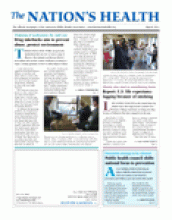Today, record numbers of children are tipping the scales in the obesity range. According to the U.S. Centers for Disease Control and Prevention, the percentage of obese 2- to 5-year-olds jumped almost 54 percent during the past three decades.
With a goal of preventing excessive weight gain in young children and reversing the trend, a new book of standards co-developed by APHA helps teachers and caregivers in early care and education programs build healthy lifestyles for generations to come. Released in November, “Preventing Childhood Obesity in Early Care and Education Programs” provides selected standards in three topic areas: nutrition, physical activity and screen time. Detailing opportunities for programs to work with families from the first day of an infant’s enrollment, the standards are based on emerging research and evidence-based findings that link eating nutritious foods, engaging in daily age-appropriate physical activities and limiting the time in front of a television or computer screen with maintaining a healthy weight.

“Obesity is of an epidemic level nationwide,” said APHA member Marilyn Krajicek, EdD, RN, director of the Colorado-based National Resource Center for Health and Safety in Child Care and Early Education. “We must address it beginning in infancy to make a greater impact. This is prevention of major health problems that people across the country will be facing if we don’t watch our food intake and what we are eating.”
Funded by the Child Care Bureau of the Department of Health and Human Services’ Administration for Children and Families, the standards were developed by APHA with the American Academy of Pediatrics and the National Resource Center for Health and Safety in Child Care and Early Education. The standards support key national campaigns for early development of healthy lifestyle habits, including first lady Michele Obama’s Let’s Move! child obesity initiative.
Also available in Spanish online at nrckids.org, the standards are specifically designed to help early care and education programs, families and agencies develop and adopt safe and healthy practices, policies and procedures that form a foundation of fitness for children that will last a lifetime.
With practical intervention strategies to prevent excessive weight gain in young children, the standards, based on scientific evidence and expert consensus, address topics such as general nutrition requirements, meal and snack patterns, requirements for toddlers and preschoolers, meal service and supervision, food brought from home, nutrition education, active opportunities for physical activity, outdoor and indoor play time, caregivers’ and teachers’ encouragement of physical activity and screen-time limits.
“Early care and education programs are the pivotal time to begin the process of intervention for obesity,” said Krajicek, who is a fellow of the American Academy of Pediatrics. “The goal is to make an impact to prevent health problems such as diabetes, stroke and heart disease.”
The standards in the new book were drawn from the third edition of “Caring for Our Children: National Health and Safety Performance Standards: Guidelines for Early Care and Education Programs,” scheduled for release this spring.
For more information or to order a copy, visit www.aphabookstore.org or e-mail apha{at}pbd.com.
- Copyright The Nation’s Health, American Public Health Association









